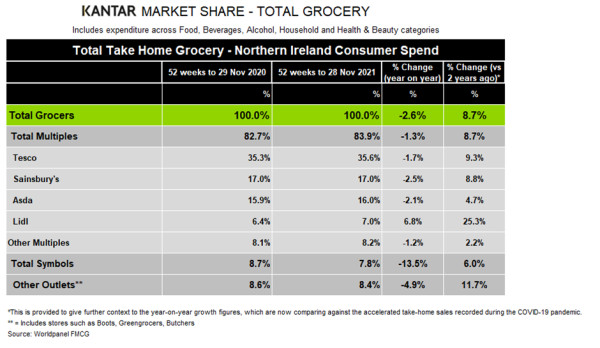The grocery market in Northern Ireland declined by 2.6% in the 52 weeks to 28 November 2021. The data from Kantar suggests that people have been shopping less and spending more time at restaurants and pubs, with supermarket trips down 2.9% compared with last year.
However, the grocery market in the region is still 8.7% larger than it was prior to the pandemic two years ago.
Emer Healy, retail analyst at Kantar, commented: “The slowdown is brought into sharper focus by the latest 12-week data, which shows a total market decline of 8.7% compared with the same period last year. Baskets are 5.9% smaller than in the same period last year and the number of trips has fallen by 6.0%.
“Alcohol sales are a good example of how periods with more relaxed Coronavirus restrictions have impacted the grocery sector. Over the past 12 months, take-home alcohol purchases have fallen by 6.1% compared with 2020 as people enjoyed going out and spending time with family and friends at restaurants, pubs and clubs again when lockdowns were eased. That change in behaviour has meant they spent less on drinks to have at home.”
Tesco has retained its spot as the largest grocer, with a 35.6% market share. Its sales edged down 1.7% over the 52 weeks, slower than the overall market.
Meanwhile, Lidl posted another set of strong growth numbers, boosting sales by 6.8% to make it the only retailer achieving growth against last year’s bumper figures.
Sainsbury’s maintained its 17.0% market share this period. However, as is the case across the sector, basket sizes were considerably smaller which led to a sales decline of 2.5%. Asda’s numbers tell a similar tale with a 6.9% decline in items purchased, contributing to an overall sales fall of 2.1%, though not affecting its market share, which edged up to 16%.

NAM Implications:
- Lidl NI, a standout opportunity…
- Enough said?



